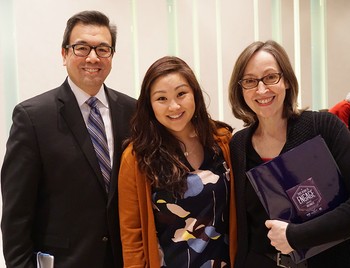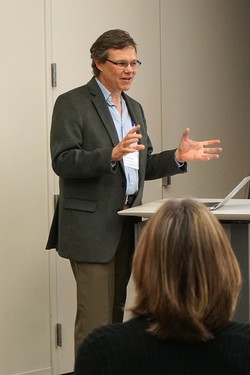As both a panelist and a presenter at Presbyterian & Pluralist: Equipping Presbyterian Colleges and Universities for Interfaith Leadership, ruling elder Rick Ufford-Chase laid bare his soul.
Ufford-Chase, moderator of the 216th General Assembly (2004), co-director of Stony Point Center, and the newly-appointed associate for Interfaith Formation for the Presbyterian Mission Agency, was one of several experts on interfaith dialogue, educators, and college chaplains, faculty, and leaders who gathered at Fourth Presbyterian Church from April 6–7 for a timely conference co-sponsored by the Interfaith Youth Core (IFYC), the Association of Presbyterian Colleges and Universities (APCU), Monmouth College, the Presbyterian College Chaplains Association (PCCA), and Fourth Presbyterian Church.
Following an exploration by the Rev. Dr. Christine Hong, assistant professor of Worship and Evangelism at Louisville Presbyterian Theological Seminary, on “The Interreligious Stance of the Presbyterian Church (U.S.A.),” a policy statement adopted by 221st General Assembly (2014), Ufford-Chase laid out the deeply personal way in which he was called to do interfaith work and what intentional interreligious relationships look like when they are lived out.
“Before I was elected moderator at the age of 40, I had never set foot in a mosque and had maybe been in a synagogue once or twice,” Ufford-Chase told an April 6 breakout session on Pluralism and the Reformed Tradition. “I always thought it was their job to understand my tradition and my culture.”
Now in his 50s, Ufford-Chase said that every decade of his life has been spent “wrestling with his unearned privilege.” In his 20s, he examined male privilege; in his 30s, heterosexual privilege, while his 40s were spent looking at questions around race.
“I had no idea that this decade would be marked by the assumptions that I have made from Christian superiority, wrestling with questions about what it means to be Christian in a Christian-dominant culture,” he said.
Ufford-Chase’s new sense of call led him to found the Community of Living Traditions at Stony Point, a multifaith community dedicated to the practice and study of hospitality, nonviolence, and justice.
“Seven years ago when we started, we were on the outer edge of what was acceptable for the denomination,” said Ufford-Chase of the intentional community that predates the PC(USA)’s interreligious stance. “Stony Point was just distant enough that we could get away with something crazy, something that is now deeply embedded in our interreligious stance. And I can say, ‘I’m still Presbyterian and we’re all still okay here.’”

Frank Yamada, Christine Hong, and Nanette Sawyer prepare for their April 6, 2016 panel at the Presbyterian & Pluralist conference. —Emily Enders Odom
Later that evening, Ufford-Chase and Hong were joined by the Rev. Nanette Sawyer, associate pastor for Congregational Life, Fourth Presbyterian Church; Dr. Marjorie Hass, president of Austin College; and the Rev. Dr. Frank Yamada, president of McCormick Theological Seminary; in a public conversation moderated by Dr. Eboo Patel, president and founder of the IFYC.
The event, “Can Presbyterians Do Interfaith?”—to which Chicago-area Presbyterians and interfaith partners were invited—addressed why and how Presbyterians engage religious diversity and seek interfaith cooperation. Patel introduced the 90-minute conversation as “a set of interesting perspectives on what commands us from our respective traditions to engage with people with whom we have deep differences.”
Patel shared a story from the years when he and his wife lived three blocks away from Fourth Church, where she regular tutored. She told Patel that she would be less of a Muslim if Fourth Presbyterian Church wasn’t here. “That’s what it means,” he said, referring to the church’s tagline, “to be a light in the city.”
The other presenters followed suit by each giving a personal testimony of how interfaith encounters enriched their lives.
Yamada, whose family observed both Buddhist and Christian traditions as he was growing up, described a poignant moment in his multireligious family after he had “converted to a proselytizing form of evangelical Christianity.” At a New Year’s celebration, which was the family’s custom, the then 20-year old Yamada was asked by his grandmother, a Buddhist, to pray the blessing for everyone in lieu of their traditional New Year’s toast.
Citing Leviticus 19:34 in which “the stranger shall be unto you as one born among you,” Yamada lifted up his grandmother’s extension of blessing to a new generation of her family. “You don’t have to be like someone to love them,” he said.
Hass, who is the first woman, and first Jewish president of Austin College, said of her first faculty appointment in the philosophy department of the Lutheran-related Muhlenberg College that she was at first “a little leery about a church-related college.”
While she was at Muhlenberg, Hass had a conversation with the Lutheran chaplain, which ultimately led them to a two-year study of the Book of Genesis. “We talked about it as friends, but from different religious traditions, always in the spirit of truth seeking to understand our own tradition,” said Hass. “It was a real friendship with a Christian—real trust, real understanding, and truly transformative for me. It was the first of what would become many friendships with people of other traditions.”
A provocative question and answer session following the panel’s presentation produced the inevitable “so what” question. If interfaith relationships are only about having a meal, wondered one audience member, “so what.”
Ufford-Chase proposed answering the “so what” question with the call to do justice. “The mission of the multifaith community at Stony Point is to stand against the lunatics in each of our traditions who have corrupted our sacred texts to bring about evil in the world,” he said. “We should be showing up in Ferguson and in Baltimore, because the young people are already there. Their surprise is, ‘You all care about this?’”
“If we’re not building toward addressing some of the egregious wrongs in the world,” he concluded, “then we’re really missing the boat.”

